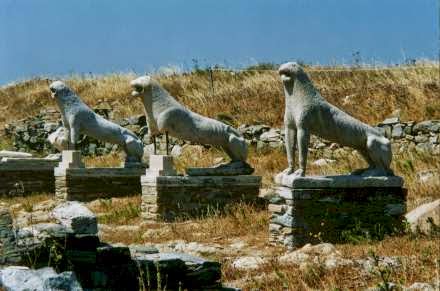The magic of Greece is in its very ambiguity, in the tensions that pull it from one wonderful, delicious extreme to the other. The senses are pleased and pampered by the serene beauty of Greece found in the depth of its vistas, the spectacular sunrises and sunsets, and the radiance of the light that even the poets cannot adequately describe. The senses are titillated and tempted, also, by Greece’s extremes of food and drink, flesh, nightlife, music, and the burning sun.
 Perhaps this tension is best exemplified in the islands that form an ancient triangle in the very heart of the Cyclades. They are cosmopolitan Mykonos, Sacred Delos, and mysterious Rhinia. Taken together, these sisters with their distinctive and contradictory personalities give the visitor a tantalizing taste of Greece known mainly to Greeks who live in the Cyclades.
Perhaps this tension is best exemplified in the islands that form an ancient triangle in the very heart of the Cyclades. They are cosmopolitan Mykonos, Sacred Delos, and mysterious Rhinia. Taken together, these sisters with their distinctive and contradictory personalities give the visitor a tantalizing taste of Greece known mainly to Greeks who live in the Cyclades.Within this triangle, one can sunbathe on some of the most beautiful beaches in Greece, literally dance until dawn at discos, take a magical, chartered cruise through the islands, go back in time with the ancients on an island declared “sacred” by the Greek government, or spend an enchanted day alone on an uninhabited island where gentle waves caress a pristine shore, luscious watermelons hang from vines, and where the pure air is so still you can hear yourself breath.
MYKONOS. Mykonos, the temptress, will seduce you with her charms. The occasional naughty sister is famous worldwide for her chalk-white beauty and vibrant nightlife. Sometimes called “Little Venice” or “The Capri of Greece,” Mykonos is considered by many to be the most cosmopolitan and sophisticated of the Greek islands and offers the very best in accommodations, food, and ambiance to the visitor.
DELOS. If Mykonos represents secular pleasures sought by the jet set, Delos is its opposite and the most sacred of the Greek islands. At the very geographical center of the Cyclades, Delos is its spiritual center as well and was the religious, cultural, and commercial focal point of ancient Greece. It was the jewel of the ancient world, a thriving commercial hub, and the “summer home” of the rich and famous of the time. Delos’ past glory is seen in the magnificent ruins and in exquisite, world-famous mosaic floors of the ruined palaces.
RHINIA. The third sister is Rhinia, a haunting, mysterious island four times the size of Delos and separated from it by a small strait. Called alternatively “Great Delos” and “Big Delos,” Rhinia is really two sections connected by a narrow isthmus. There are four, pristine, sandy beaches, each with its own characteristics, on the uninhabited island.
By Greek law, excerpt for a home built for a captain who supervised the quarantine of ships in the early 1900s, no one is allowed to live on this island or build a permanent home there; there is no running water or electricity and there are no roads on its rocky, hilly terrain. (There are rumors, however, of a few hearty souls who make the island their home in shepherd’s huts.) Very few tourists know about the island or have an interest in going there on a day’s excursion.
If you have a sense of adventure, it is possible to set foot on Rhinia. Simply go to the harbor of Mykonos when the fishing boats arrive in early morning and make a deal with a fisherman to take you there and bring you back. Back your bathing suit, food and wine, a blanket, and an ample supply of suntan lotion.
Published in The National Herald, December 2013






